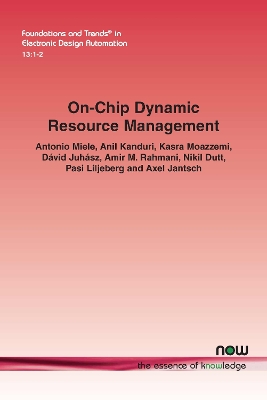Foundations and Trends (R) in Electronic Design Automation
1 total work
On-Chip Dynamic Resource Management
by Antonio Miele, Anil Kanduri, Kasra Moazzemi, David Juhasz, Amir R. Rahmani, Nikil Dutt, Pasi Liljeberg, and Axel Jantsch
Published 1 July 2019
Resource management has a long history in computing, from the early days of time-shared machines with pioneering fundamental work on run-time systems, distributed systems, real-time operating systems and middleware. The longevity and fundamental importance of the topic has resulted in an incredibly large body of work for on-chip resource management in the past two decades. The possible combinations of sub-topics and variations in the assumptions, use of different terminology, metrics, goals, and use-cases, leaves anyone attempting to review the literature overwhelmed.
On-Chip Dynamic Resource Management is the first comprehensive and coherent review of all aspects of on-chip run-time resource management designed to facilitate understanding of recent trends in dynamic and adaptive strategies. The authors provide the reader with a framework within which they can navigate both existing, as well as evolving research efforts in on-chip dynamic resource management.
Written by leading experts in the field, researchers and students are provided a structured review and discussion of the state of the art that is divided along the primary objectives of resource management techniques: performance, power, reliability and quality of service.
On-Chip Dynamic Resource Management is the first comprehensive and coherent review of all aspects of on-chip run-time resource management designed to facilitate understanding of recent trends in dynamic and adaptive strategies. The authors provide the reader with a framework within which they can navigate both existing, as well as evolving research efforts in on-chip dynamic resource management.
Written by leading experts in the field, researchers and students are provided a structured review and discussion of the state of the art that is divided along the primary objectives of resource management techniques: performance, power, reliability and quality of service.
